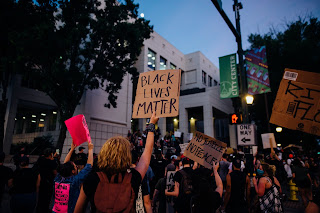MORE THAN A FLASH MOB MOMENT ?
By Claire W. Stanard
Egregious injustice and the incitement of protests, violence, and lawlessness is a confounding issue.
Many may now be questioning how to differentiate between constitutionally sanctioned protests and the lawbreaking riots and looting that also ensued. While most are all for peaceful protests, they don’t condone the resulting criminal violence as relating to George Floyd’s needless murder by Minnesota police. They understand that Blacks have historically been unfairly targeted by law enforcement using unnecessary force, but don’t understand how that translates into stealing, destroying, and ravaging our communities in response. The destructive violence inevitably distracts from the original message of the protests, so the credibility of the message becomes lost in those extreme manifestations. On the surface, this can appear to be a fair appraisal.
However, when looking deeper, this generally held view by non-Blacks does not take into consideration the depth of the rage from being treated like 3/5’s a person that Blacks inherently have experienced as a group throughout their lives due to their ancestors’ enslaved, objectified status. In addition, the ‘economic snobbism’ against the poor, the uneducated, the jobless, and people born with few equal opportunities expands this bias. These economic gaps become synonymous with general groups of people who become labeled as ‘less than.’ Add skin color or anatomical differences on top of being economic ‘have nots,’ and entire groups of people can be easily viewed as not really mattering in society, due to the lack of quantifiable contribution they appear to be making towards bettering America. The prevailing attitude becomes ‘producers’ versus ‘takers.’ A sense of superiority breeds racism.
Many Americans also believe that anyone who is not actively involved in capitalist enterprise, not assimilating to a traditionally white ‘American looking’ way of life, not Christian, or not able to overcome personal obstacles of birth is basically un-American. Such people are thus deserving of being looked down upon and disregarded. Many immigrants are put into this ‘less than’ category. They may be depended on as an essential labor force, but they are not judged ‘fully’ American by many of their fellow citizens. Many believe that America as a ‘melting pot’ means melting away ethnic characteristics into a homogenized U.S.A. prototype. The idea that the U.S. was intended to be a ‘white man’s’ country simply because whites were a majority, contrasts with the inclusive premises upon which our country was founded.
Then there is the systemic issue of crime. If a certain group of people have historically committed more crimes than others, shouldn’t they be more suspect and targeted by police? ‘Stop and frisk’ was a perfect example of this idea. Regardless of the stats, the real question is how such crime inevitably evolves. Aren’t economic ‘have nots’ more desperate with nothing left to lose than other stratum of society? Nothing makes crime okay, but it needs to be understood. And, as more criminals from specific groups are convicted, doesn’t that result in their being targeted and presumed guilty even more in the future. When not being ‘politically correct,’ most white people would admit that they would be more scared to pass a Black man in an alley, than a White one. And most Blacks will admit they are forced to train their children on how to not look suspicious in their daily lives.
Yes, conversations need to be engaged in regarding racism, bias, and economic/social condemnation of others. But as a relative recently stated, “there is no such thing as a ‘color blind’ person in the U.S., because differentiation is ingrained in our society.” Find someone to look down upon, and for a moment, one can feel better about himself: ‘If I am right, they are wrong.’ ‘I am not comfortable being around people who have different values than I do.’ ‘There is a way to live and behave, and their way is not it.’ ‘Your way of life threatens the future of my way of life.’ ‘My rights are more important than your rights, because I contribute more to society.’ For many, the American way of life means looking, living, and worshiping in a certain way. Or another side might say they want to identify first with their country of origin, not be forced to assimilate, maintain separate ethnicity, demand reparations, receive equal treatment and cultural respect, and consider you a racist if you mention their differences as part of a distinct group. Where do the conversations honestly begin?
The George Floyd matter needs to represent more than just a flash mob moment of protest. Something must change without waiting for French revolution style riots by the ‘have nots’ alongside the oblivious attitudes of the privileged. As Kimberly Jones said in her video, “They are lucky that Black people are only looking for equality and not revenge.” There will be no easy answers, but there must be tolerant, difficult conversations that will never be ‘politically correct’ but might allow us to live together with mutual respect and actual equal rights.



Comments
Post a Comment